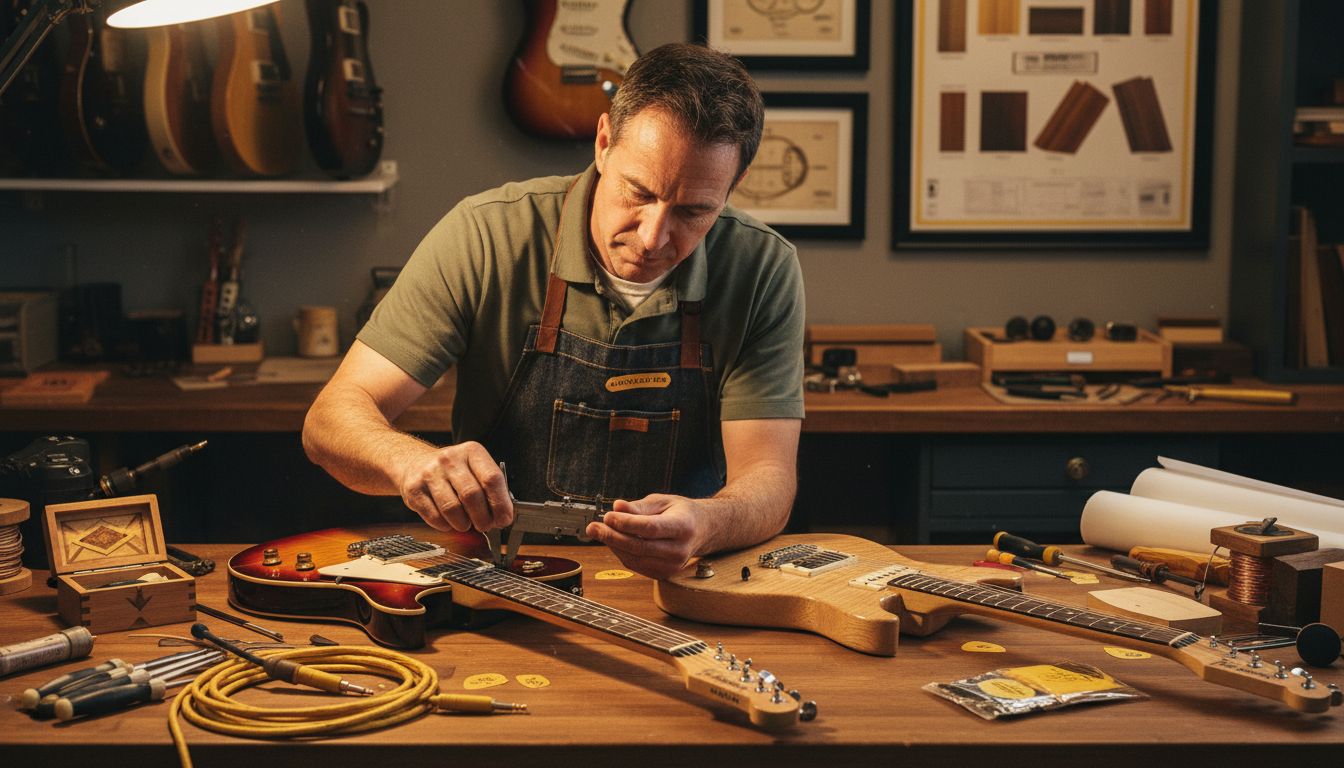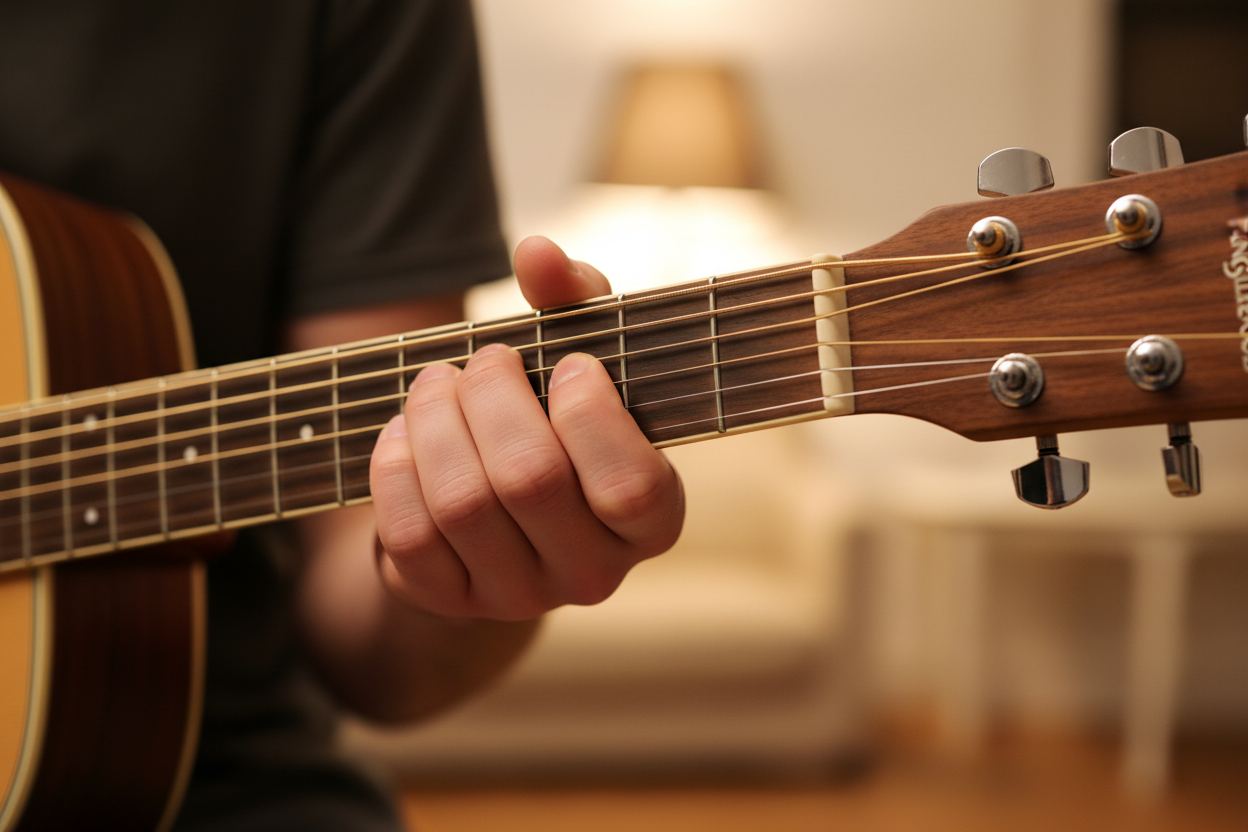Is the Guitar Experiencing a Renaissance?
In recent years, there has been a noticeable resurgence in the popularity of the guitar. With the rise of social media and online platforms, more and more people are discovering the joy of playing this versatile instrument.
Why is the Guitar Making a Comeback?
There are several factors contributing to the guitar's renaissance:
1. Accessibility
The guitar is a relatively affordable instrument compared to others. It is widely available and accessible to people of all ages and backgrounds. With the advent of online tutorials and lessons, learning to play the guitar has never been easier.
2. Versatility
The guitar is a versatile instrument that can be used in various genres of music, from classical to rock to jazz. Its adaptability makes it appealing to musicians of different styles and preferences.
3. Social Connection
Playing the guitar is often a social activity. It brings people together to jam, perform, or simply enjoy music. With the rise of online communities and platforms, guitar enthusiasts can connect with like-minded individuals from all over the world.
4. Nostalgia
The guitar has a rich history and is deeply rooted in popular culture. Many iconic songs and performances have featured the guitar, creating a sense of nostalgia for both seasoned players and newcomers.
In a world dominated by technology and digital innovation, the enduring popularity of the guitar truly stands out. From its humble beginnings to its presence on stages, in recording studios, and in living rooms across the globe, the guitar has achieved a near-iconic status. And now, it is experiencing a renaissance.
In this article, we will delve into the growing popularity of this timeless instrument and discover why it continues to captivate musicians and music enthusiasts alike. From its versatility as both a solo and accompanying instrument to its ability to evoke emotions and tell stories, the guitar's appeal is truly unmatched.
We will explore the factors contributing to this renaissance, including the rise of online learning platforms and the accessibility of affordable instruments. Additionally, we'll uncover the role of social media in amplifying guitar culture and fostering connections within the thriving guitar community.
Join us as we embark on a musical journey, unravelling the magic and allure of the guitar. Whether you're a seasoned player or simply curious about its enchanting power, this article is a must-read for anyone intrigued by the guitar renaissance.
The history and evolution of the guitar
The guitar has a rich and fascinating history that spans centuries. Its origins can be traced back to ancient civilizations, where the first primitive stringed instruments were developed. Over time, these instruments evolved into the guitar we know today. From the classical guitar of the Renaissance period to the electric guitar that revolutionized popular music in the 20th century, the guitar has undergone numerous transformations.
One significant milestone in the guitar's evolution was the invention of the electric guitar by Adolph Rickenbacker in the 1930s. This innovation paved the way for a new era of guitar playing and allowed musicians to explore new sounds and techniques. Today, the guitar continues to evolve with advancements in technology, such as the integration of digital effects and modeling.
Despite these changes, the guitar has managed to maintain its timeless appeal. Its versatility as both a solo and accompanying instrument, as well as its ability to adapt to various genres and styles of music, has contributed to its enduring popularity.
The enduring appeal of the guitar
What makes the guitar so appealing? One of the key factors is its ability to evoke emotions and tell stories. Whether it's the haunting melodies of a classical guitar piece or the raw energy of a rock guitar solo, the guitar has a unique power to connect with listeners on a deep emotional level.
Furthermore, the guitar's portability and accessibility make it a popular choice for aspiring musicians. Unlike larger instruments, such as pianos or drums, the guitar can be easily transported and played in various settings. This flexibility allows beginners to practice and perform wherever they go, making it an ideal instrument for learning and self-expression.
Additionally, the guitar's versatility extends beyond its musical capabilities. Its aesthetic appeal and iconic shape have made it a symbol of rebellion, creativity, and self-expression. From the rebellious spirit of rock 'n' roll to the introspective nature of folk music, the guitar has become synonymous with artistic expression and individualism.
The rise of online guitar lessons and tutorials
In recent years, the internet has revolutionized the way people learn and access information. This shift has had a profound impact on the guitar community, with the rise of online learning platforms and tutorials. Now, aspiring guitarists can learn from the comfort of their own homes, at their own pace, and with access to a vast library of resources.
Online guitar lessons offer several advantages over traditional methods. They provide flexibility in terms of scheduling and allow students to tailor their learning experience to their specific needs and goals. Additionally, online tutorials often include interactive elements, such as videos and quizzes, that enhance the learning process and make it more engaging and enjoyable.
Furthermore, online platforms have democratized guitar education by making it accessible to a wider audience. Previously, learning the guitar required finding a local teacher or attending music classes, which could be expensive and limited by geographical constraints. Now, anyone with an internet connection can access high-quality guitar lessons from renowned instructors around the world.
The impact of social media on the guitar community
Social media platforms have become powerful tools for connecting people with shared interests and passions. This is particularly true for the guitar community, where platforms like Instagram, YouTube, and Facebook have played a significant role in amplifying guitar culture and fostering connections among guitarists.
On these platforms, guitarists can showcase their skills, share their original music, and engage with other musicians and enthusiasts from all over the world. This sense of community and camaraderie has created a supportive and inspiring environment for guitarists of all levels.
Additionally, social media has provided a platform for guitar manufacturers, music stores, and other industry players to reach a wider audience. Through targeted ads, sponsored content, and collaborations with influential guitarists, these companies can promote their products and services to a global community of guitar enthusiasts.
The guitar industry and its economic growth
The growing popularity of the guitar has not only impacted musicians and enthusiasts but has also contributed to the economic growth of the guitar industry. From guitar manufacturers to music retailers and repair shops, the demand for guitars and related products and services has been steadily increasing.
This growth can be attributed to a variety of factors. The accessibility of affordable instruments has made it easier for beginners to start playing the guitar, resulting in a larger customer base. Additionally, the rise of online sales and e-commerce platforms has made it more convenient for consumers to purchase guitars and accessories.
Furthermore, the guitar's popularity has led to an increased demand for guitar-related products and services. From guitar lessons and instructional books to guitar pedals, amplifiers, and recording equipment, there is a thriving market catering to the needs of guitarists.
Famous guitarists and their influence on the instrument's popularity
Throughout history, certain guitarists have left an indelible mark on the instrument and its popularity. From legendary players like Jimi Hendrix, Eric Clapton, and Jimmy Page to contemporary virtuosos like John Mayer and Slash, these guitarists have inspired countless aspiring musicians and pushed the boundaries of what is possible on the instrument.
Their unique playing styles, innovative techniques, and iconic performances have captivated audiences and elevated the guitar to new heights. Moreover, their influence extends beyond their music, as they have become cultural icons and role models for aspiring guitarists worldwide.
The different types of guitars and their unique characteristics
The guitar comes in various shapes, sizes, and styles, each with its own unique characteristics and sound. The two most common types of guitars are the acoustic and electric guitar.
Acoustic guitars produce sound through the vibration of the strings, which resonates through the body of the instrument. They are often associated with folk, country, and singer-songwriter genres and are known for their warm and organic sound.
On the other hand, electric guitars use electromagnetic pickups to convert string vibrations into electrical signals, which are then amplified through an amplifier. Electric guitars have a more versatile sound and are commonly used in genres such as rock, blues, and jazz.
Within these broad categories, there are numerous subcategories and variations of guitars, each with its own unique sound and playing characteristics. From the classical guitar to the jazz archtop, the acoustic-electric to the solid-body electric, there is a guitar for every musical style and preference.
How to choose the right guitar for your needs
Choosing the right guitar can be a daunting task, especially for beginners. With so many options available, it's important to consider your musical preferences, playing style, and budget when making a decision.
First and foremost, consider the type of music you want to play. If you're interested in fingerstyle or classical music, an acoustic guitar with nylon strings may be the best choice. If you prefer rock or blues, an electric guitar with a solid body and humbucker pickups might be more suitable.
Next, consider your playing style and skill level. Some guitars have a wider neck, which may be more comfortable for beginners or players with larger hands. Others have a thinner neck, which is favored by players who prefer faster, more technical playing.
Finally, set a budget for your guitar purchase. While it's tempting to splurge on a high-end instrument, there are plenty of affordable options available that offer great sound and playability. It's important to find a balance between quality and affordability to ensure you get the best value for your money.
The benefits of learning to play the guitar
Learning to play the guitar offers numerous benefits beyond the joy of making music. It can improve cognitive abilities, enhance creativity, and boost self-confidence. Playing the guitar also provides a healthy outlet for stress relief and emotional expression.
Moreover, learning an instrument promotes discipline and perseverance. It requires regular practice and dedication to develop skills and improve as a musician. This discipline can translate into other areas of life, such as academics or professional pursuits.
Additionally, playing the guitar can be a social activity. Joining a band, jamming with friends, or performing in front of an audience can create lasting memories and foster connections with like-minded individuals.
As technology advances and music evolves, the guitar will continue to adapt and remain relevant in music culture. While new instruments and technologies may emerge, the guitar's timeless appeal and versatility ensure its enduring place in the hearts of musicians and music enthusiasts.
Furthermore, the guitar's accessibility and affordability make it an ideal instrument for beginners and aspiring musicians. Online learning platforms and resources will continue to make guitar education more accessible, allowing more people to discover the joy of playing the guitar.
In conclusion, the guitar's enduring popularity and recent renaissance can be attributed to a combination of factors, including its versatility, emotional appeal, and accessibility. The rise of online learning platforms and social media has played a significant role in amplifying guitar culture and connecting guitarists worldwide.
As the guitar industry continues to grow, more people are discovering the joy of playing this timeless instrument. Whether you're a seasoned player or a beginner, the guitar offers endless possibilities for creativity, self-expression, and musical exploration. So, pick up a guitar and join the guitar renaissance today!
Conclusion
The guitar is indeed experiencing a renaissance. Its accessibility, versatility, social connection, and nostalgic appeal have contributed to its resurgence in popularity. Whether you're a beginner or a seasoned player, now is a great time to pick up the guitar from musicstreet and join the growing community of guitar enthusiasts.




Share:
The Fender Stratocaster, Did Leo get it right first time? A timeless classic
Daily practice tips for electric guitar players